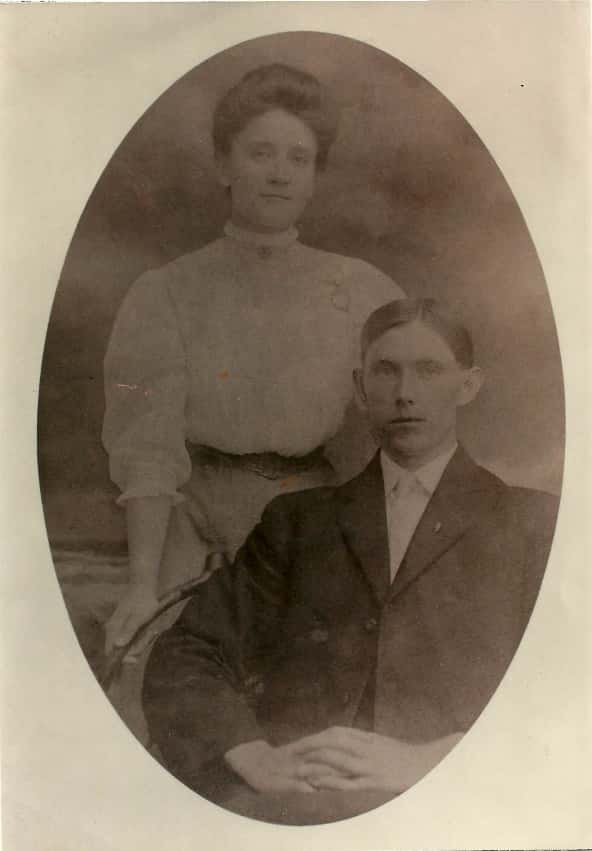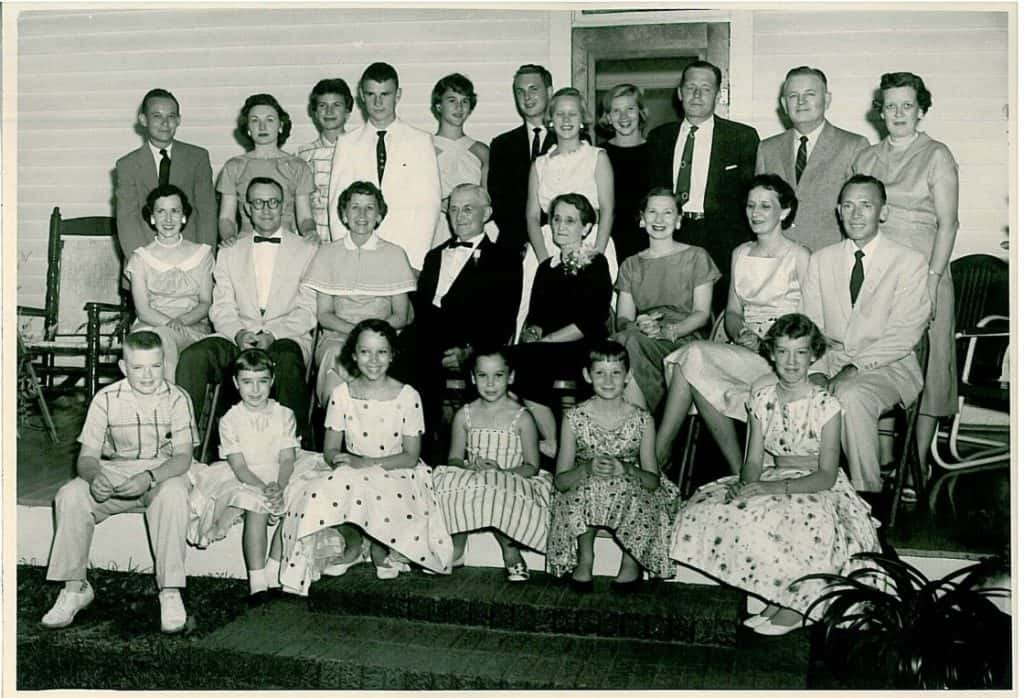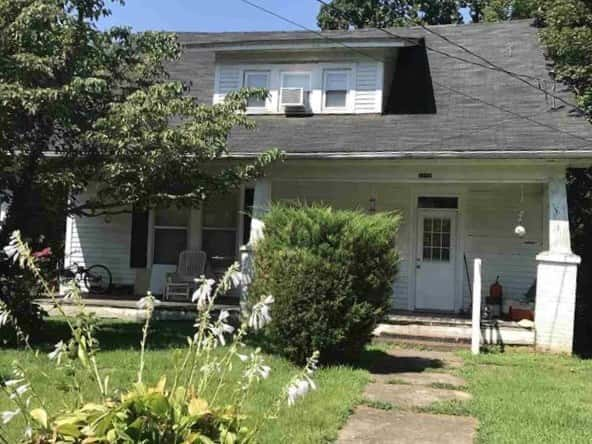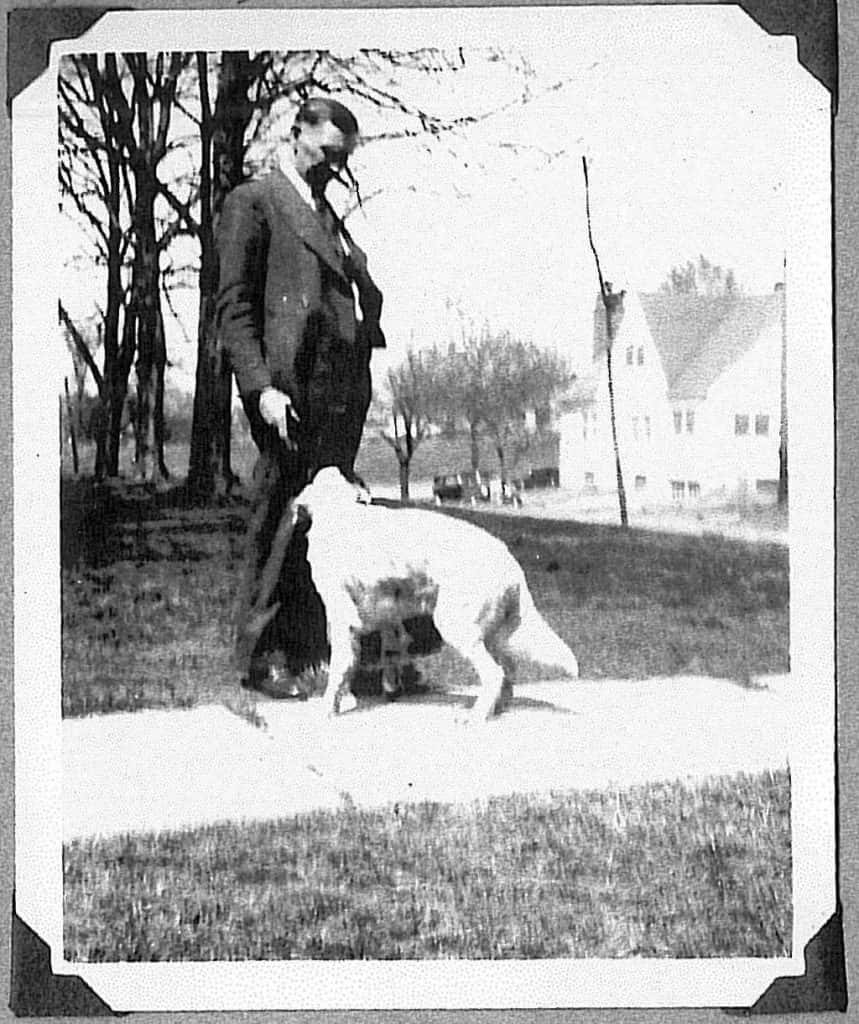THE LIFE OF JUDGE H.H. LOVETT
PART TWO:
FAMILY MAN
Written by Justin D. Lamb
H.H. Lovett met Mayme Rudolph of the Sharpe community in Marshall County around 1907. Mayme was born on July 31, 1885 and was the daughter of Robert H. Rudolph and Silvia Jane Phelps Rudolph. Like H.H., Mayme lost her mother when she was only three years old and was left to be raised by her older siblings. The death of Mayme’s mother was felt by everyone in the Sharpe community and one neighbor, M. Branon, published a letter of tribute in the Paducah News honoring the late Silvia Jane Rudolph:
“The death of Mrs. Silvia Rudolph, who deceased life January 1st, was briefly mentioned in your paper, but I think and feel it proper that a short biography of such a lovely lady as was Mrs R should be given for public reading. The deceased was beloved by all who knew her. She was the wife of R H Rudolph and the daughter of Samuel Phelps, deceased. Was borned in 1852 and married to Mr R in 1872, living a happy and agreeable life until death’s summons. She was a Christian and member of the Cumberland Presbyterian Church, having professed faith in Christ at an early age. On her dying bed she exhibited a realization of a home beyond this vale of tears. She left a fond husband, five children, and aged mother, four sisters, two brothers and a host of kind friends to mourn her sudden departure. A few moments before she expired she called, in turn, each of her dear children to her bedside and bid them farewell for a while, telling them to be kind to their dear papa and meet her in that clime of ultimate glory. The deceased was a relative of the writer, but I must say her sociableness and pleasant address were not surpassed by any one. Her home was place of peace and harmony, both to the family and those who came about. She made friends wherever she went and like Queen Vashti observed the veil of modesty. In conclusion will say to the sorrow stricken family, wipe away your tears and weep not for long – all will be gathered by a convoy of angels, to that same blessed habitation. Departing friends leave behind examples good and true that we should accept and follow too.”
Mayme’s father, Robert H. Rudolph was a prosperous farmer in the Sharpe community and was the eldest of ten children. The Rudolph family immigrated from German to Rowan County, North Carolina before the Revolutionary War. From there they went to Clarksville, Tennessee and then Ballard County, Kentucky before finally settling in Marshall County, Kentucky. Robert Rudolph had lived in Marshall County most of his life and married Silvia Jane Phelps on November 19, 1872. Robert Rudolph was a devout Cumberland Presbyterian and raised his children as such. After the passing of his first wife, Robert Rudolph married Mollie Truitt Bailey in 1894. Robert Rudolph passed away at the age of 80 on January 16, 1933. He was laid to rest next to his first wife in the Oakland Cumberland Presbyterian Church Cemetery in Sharpe.

Wedding photo, 1907
H.H. Lovett first met Mayme Rudolph while he was teaching school at Sharpe and she was his student. Only four years in age separated the two and the young couple soon began courting. When H.H. received a teaching job at Benton Seminary School, Mayme followed him to continue her education. After nearly a year courtship, the two married on June 4, 1907 at the home of the bride’s father in Sharpe. Mayme’s uncle, Rev. Sam Rudolph, performed the ceremony and with the witnesses for the ceremony being Sam Ely and W.A. Rudolph.
***
H.H. and Mayme Lovett’s marriage was blessed with six children. Their first child arrived on April 8, 1909 when Roberta Aline Lovett was born in Chaffee, Missouri. Aline was raised in Marshall County and married George Saufley of Stanford, Kentucky. They had two daughters, Sue and Dee Dee. Aline was known as a kind and generous woman and a passionate fan of University of Kentucky basketball and football. Sadly, Aline passed away shortly before the research of this book began at the age of 100 on June 28, 2009 and was buried in the Buffalo Springs Cemetery in Stanford, Kentucky.
The second child of Henry and Mayme was Mary Brooks Lovett who was born on March 4, 1911. Known to everyone as “Brooks,” she was a quiet, caring woman. She was born in Bardwell while her father was teaching school in Bardwell County Schools and she moved to Olive when she only a few years old. She was avid reader and loved poetry, a trait which she inherited from her father. Brooks and her father exchanged books and poems throughout his life. Brooks married James Edward “Jim Ed” Cross on June 12, 1930. Jim and Brooks had two daughters, Shirley Cross Boone and Jane Cross Nelson and a son, James L. Cross. Brooks was at one time director of the both the dormitories at Murray State University and the Wesley Center. After the death of her husband in 1949, Brooks never remarried. Brooks passed away on September 7, 1996 and was buried in the Benton Cemetery.
Next came Grace Lovett who was born on January 9, 1913 in Olive. Grace was a very fashionable lady and was very active in the Methodist Church where she taught Sunday School. She married Albert A. “Pont” Nelson and helped him run Nelson’s Drug Store on Main Street in Benton for many years. Grace and Pont had three children, Rosalind “Punky” Nelson, Phyllis “Phil” Nelson, and Charlotte “Skeet” Nelson. After the death of “Pont” in 1983, Grace lived in Louisville with her daughters until her death on April 5, 2004. She is buried in the Benton Cemetery near her parents.
Henry and Mayme’s first son was Henry Hardin Lovett, Jr. who was born on December 9, 1914 in Marshall County. He was known to everyone as “little Henry” or “Henry Hardin” and as an infant he was stricken with polio. He survived the disease, but it rendered his right leg to be about one inch shorter than his left and caused him to walk with a limp. Henry attended grade school in Benton and graduated from Benton High School in 1932. He attended college at Murray State University and later enrolled in law school in Louisville.
Henry Hardin met Miss Dorothy Lee shortly before the war, daughter of Solon and Bessie Lee of Paducah, and the couple eventually married on November 22, 1941 at Emmanuel Baptist Church in Paducah. On May 6, 1945, the couple welcomed their first and only child, Nancy Lee Lovett Warmath, and they moved back to Marshall County. Under the guidance of his father, Henry Hardin became an attorney and Dorothy operated a gift shop on Benton’s court square. Henry Hardin was in poor health most of his life and on June 28, 1968, he passed away in Memphis, Tennessee. He was buried in Benton Cemetery.
The fifth child of Henry and Mayme Lovett arrived on October 7, 1916. Named after his father’s cousin, John Clay Lovett would become one of Marshall County’s most successful citizens. John Clay graduated from Benton High School in 1933 and later went to Western Kentucky University. After college, John Clay enrolled in law school at Harvard where he graduated in 1940. He then went on to become a Special Agent for the Federal Bureau of Investigation and then he joined the army during World War II.
After the war, John Clay became an attorney for the Tennessee Valley Authority until he moved back home and joined his father and brother’s law firm in Benton. In the early 1960s, John Clay Lovett argued a commerce dispute case before the United States Supreme Court on behalf of Arrow Transportation. He was later appointed Circuit Judge of the 42nd Judicial District in 1986, served one year, and then retired from public service. He married Lunell Culp in 1941 and they had two children, John Culp Lovett and Jerilane Lovett Harrell. John Clay Lovett passed away in 2004 and was buried in the Benton Cemetery.
On October 5, 1924, Henry and Mayme Lovett welcomed their youngest child, Sylvia Jane Lovett who was named after her maternal grandmother, Silvia Jane Rudolph. Everyone referred to her simply as ‘Jane’ and she attended school in Benton. Jane married Rob T. Bradley and they had two daughters, Ann Ross Bradley Rudolph and Rebecca Bradley Rice. After Rob’s death in 1993, Jane married longtime Benton City Councilman Kenton Holland. Jane passed away on April 10, 2009. She is buried in the Benton Cemetery.
***
H.H. Lovett adored his thirteen grandchildren, and during the research of this book, it is clear that his grandchildren returned that love. Known by his grandchildren as “Dad” Lovett, H.H. Lovett enjoyed being a grandfather. He was a natural storyteller and he loved to recite work of the famed poet, James Whitcomb Riley, for his grandchildren. “The Raggedy Man”, “Little Orphan Annie,” and “When the Frost Is on The Pumpkin” were his favorites. Lovett had a keen sense of humor and always had a joke, a funny story or anecdote to tell. “I remember his twinkling eye and his sometime mischievous grin,” Granddaughter Shirley Boone recalled.

Judge Lovett and his family in 1957 at his home on Walnut Street.
Jane Cross Nelson, another granddaughter of Lovett recalled her grandfather’s playfulness, “Dad Lovett used to get us in a hold or bear hug and wouldn’t let loose until we said “calf rope.” I don’t know where this saying came from but it was the signal that you gave up. He also used to say to us jokingly, ‘I don’t know what we’ll do with you, guess I’ll just swap you for a jug of buttermilk and a muley calf,’” Nelson recalled.
The Lovett grandchildren spent a great deal of time at the Lovett home located at 1408 Walnut Street. Across the street from the Lovett home once stood a house that also served as a “mini mart” that sold candy, sodas, and other snacks. Lovett would give each of his grandchildren a couple of pennies, sometimes a nickel, to go across the street and get some candy from the candy counter. His only rule was that they could not buy any bubble gum.

The home of Judge Lovett is still standing on Walnut Street.
His grandchildren would often bring friends over to his house and he would make their friends feel welcome. A natural politician, Lovett would go through the friend’s family, asking who their parents were or who their grandparents were, until he got a connection. As lifelong resident of the county, he almost always knew someone in their family. H.H. Lovett was indeed a family man and his family was around often. Nearly every Sunday after church, his entire family would come to his house for Sunday dinner. After eating, the men would sit on the front porch swapping stories and smoking cigars while the women would gossip in the house as they cleaned up in the kitchen. During the summer months, H.H. and Mayme Lovett could often be seen sitting on their rocking chairs on their front porch.
Christmas was a very special time in the Lovett household. Every year, H.H. Lovett would give each of his grandchildren a silver dollar. The family also took part in a game called “Christmas Gift” which became a family Christmas tradition. Jane Cross Nelson explained the nature of the game, “On Christmas day when the phone would ring, whoever would answer it would answer with “Christmas Gift” – if the person on the other end was a family member they would laugh saying you got me. (If it were someone else, they were perplexed.) This went on all my life and still goes on today between my cousins and I. Unfortunately none of us know why or how it started. I asked all my aunts before they died and they didn’t know. I never did ask Dad Lovett, I just never questioned it at that time. I guess it was a way of giving a present when you weren’t able to give a real gift but I’m not sure.”

Judge Lovett with one of his beloved bird dogs.
Lovett had many hobbies to keep him busy while not working. He was an avid outdoorsman who enjoyed hunting and fishing. He loved to squirrel hunt and he did so well up into his eighties. According to his grandchildren, his favorite type of hunting was bird hunting and he always owned a bird dog. He treated his bird dog like one of the family, so much so that his wife Mayme Lovett would often get very upset at him when he would put the dog’s food bowl directly on the kitchen table after supper for the dog to eat!
Lovett loved to play golf and played at Kentucky Dam Village because it was one of the very few golf courses in the area. Lovett loved to work in his rose garden as well and he most always had a vegetable garden growing items that were a staple of any western Kentucky diet: tomatoes, beans, okra, corn, and a “nickel’s worth” of turnip greens.
Lovett was a very generous and caring individual, a trait which he inherited from his father and due to his own humble beginnings he was very compassionate to those who were less fortunate. During the Great Depression, many had fallen on hard times and they would wander the streets throughout the county going from house to house asking for help. When one of these destitute individuals would come to the Lovett home asking for assistance, H.H. Lovett always gave something despite having very little himself.
In a time when Jim Crow was the law of the land in the South, Lovett was respectful to those of color and treated them as equals. On one occasion, during the early 1940s, a black family had no other place to go, so Lovett opened up his home and let them stay in his basement. The basement was unheated, so he and Mayme covered the walls with old newspapers to keep the cool winter air out. Interestingly, those old newspapers are still on the walls of the old Lovett home today.
H.H. Lovett was a heavy smoker and always had a short cigar in his mouth. He would often light one up before church on Sunday and would not finish it before arriving for services. Near the door of the old Benton Methodist church on court square there were two places where the mortar had been whittled out from between the bricks, one on the left side of the door and the other on the right. Every Sunday, Judge Lovett would extinguish his cigar just before entering the church and place his cigar in one of these nooks. The other nook held one of his best friends, Arch Nelson’s cigar. In between Sunday School and the sermon, Lovett and Nelson would sneak out and have a few puffs on their cigars before returning back to the church.
